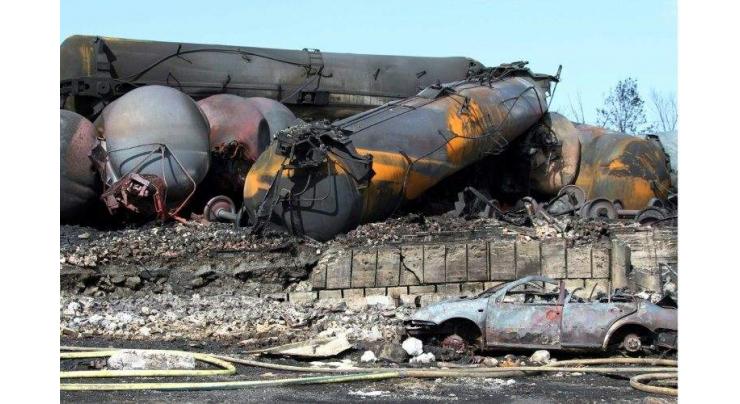
Trio Acquitted Of Negligence In Canada Railway Disaster
Sumaira FH Published January 20, 2018 | 10:05 AM

A Canadian jury on Friday cleared three railway workers of criminal negligence in one of the nation's worst train disasters, which killed 47 people in Lac-Megantic, Quebec in 2013
Montreal, (APP - UrduPoint / Pakistan Point News - 20th Jan, 2018 ) :A Canadian jury on Friday cleared three railway workers of criminal negligence in one of the nation's worst train disasters, which killed 47 people in Lac-Megantic, Quebec in 2013.
Former Montreal, Maine & Atlantic (MM&A) train conductor Thomas Harding, operations manager Jean Demaitre, and railway traffic controller Richard Labrie, faced 47 counts of criminal negligence -- one for each death.
After an almost four-month trial, the jury struggled over nine days to reach a verdict, asking the presiding judge on several occasions for clarifications on matters of law, raising concerns they might have become deadlocked.
The three accused could have faced life in prison, if convicted. "Mr Harding is too emotional to give a coherent account of how he feels," his lawyer Thomas Walsh told reporters after the verdicts were handed down.
"But I think he feels relieved," he said. "It's been four and a half years that he's carried this on his shoulders, so he's happy to finally turn the page." Demaitre echoed the sentiment upon exiting the courtroom, while Labrie burst into tears as he tried to read a brief statement.
He said he hoped the trial had provided some answers to the friends and families of the victims about what really happened the night of the crash and why. This had been "a long, hard process, but now it's over," Labrie said.
In addition to the casualties, more than 30 buildings in Lac-Megantic were completely destroyed on July 9, 2013 when a 72-car train derailed and exploded. It was carrying 7.7 million liters (2.0 million gallons) of shale oil from the US state of North Dakota to a refinery in easternmost Canada when it came loose in the middle of the night and rolled downhill, unmanned.
More than 2,000 people -- or a third of the residents -- had to be evacuated from the picturesque lakeside town about 250 kilometers (155 miles) east of Montreal.
Firefighters needed two days to put out the inferno.
After the crash, US-headquartered Montreal, Maine & Atlantic declared bankruptcy. Charges against the company are still pending. - Poor safety standards - Transportation Safety board investigators blamed poor safety standards and a lack of regulatory oversight for the crash.
In a 191-page report they listed contributing factors including improper brake tests, a highly flammable cargo in substandard tanker cars and a curve in the tracks at the bottom of a slope. "Take any one of them out of the equation and this accident may not have happened," TSB chair Wendy Tadros said at the time.
Harding, who was not at the train's helm at the time of the accident, was accused of failing to apply enough brakes on the cars. Firefighters responding to a small locomotive fire later that night shut off power to the locomotive, inadvertently causing the air brakes to gradually lose pressure.
Left unattended overnight, the train started to roll downhill, reaching a top speed of 105 kilometers (65 miles) per hour. Many Canadians looked to the criminal trial for closure, but others felt the three accused should never have been charged and that the shortline MM&A railway was at fault for cutting corners on maintenance and employee training, and on the government for ignoring safety concerns.
The TSB agreed, citing the company's "weak safety culture" and a "largely unchecked" boom in rail shipments of oil from 500 in 2009 to 160,000 in 2013. "We can't hold people criminally responsible for not being perfect," defense lawyer Charles Shearson told the court during the trial.
In the aftermath of the disaster, authorities announced tougher rail safety rules, including the phasing out or retrofitting of substandard tanker cars used to transport flammable liquids.
Related Topics
Recent Stories

Tennis: ATP Barcelona Open results - 1st update

Swiatek's perfect 10 in Stuttgart as Vondrousova stuns Sabalenka

Arandu's roads closed due to flooding

Oil tanker catches fire in Islamabad’s Blue Area

Pakistan committed to ensure safety of foreign nationals: FO

Tennis: WTA Stuttgart results - 1st update

Four passengers injured as train hit an empty vehicle

Over- speeding bus crushed to death two bike riders

Turkey's Freedom Flotilla ready to set sail for Gaza

French teen dies from heart failure after knife attack near school

Iranians appear unfazed by Isfahan blasts

UAF celebrates Int'l Chinese Language Day
More Stories From World
-
Oil, gas drilling blocked in Alaska wilds as Biden seeks green cred
42 minutes ago -
Man sets self on fire outside Trump trial
42 minutes ago -

Turkey's Freedom Flotilla ready to set sail for Gaza
2 hours ago -

French teen dies from heart failure after knife attack near school
2 hours ago -

Iranians appear unfazed by Isfahan blasts
2 hours ago -

Ecuador mayor killed ahead of anti-crime referendum: police
3 hours ago
-

Croatia top court bars president from becoming next PM
3 hours ago -

Lacking storm drains, Dubai sees persistent flooding
3 hours ago -

West Bank villagers vigilant but vulnerable after settler attacks
3 hours ago -

Calls for calm after reported Israeli strike on Iran
3 hours ago -

Iran blasts rattle global markets
3 hours ago -

Photography is 'mirror on society': Sebastiao Salgado
3 hours ago









